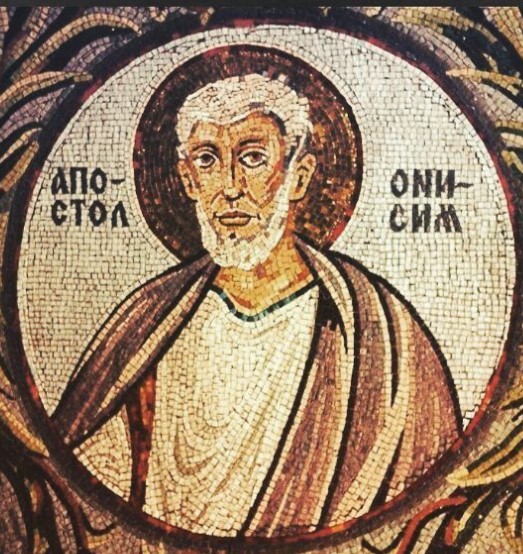Philemon 1:1-21

I wonder how many of you knew the story of Philemon and Onesimus before hearing it this morning. This is not a very popular text. Unlike most of the letters in our bible, this one doesn’t have any weighty theological arguments for a preacher to dig into. Unlike most of the other letters in our bible, this one is very brief; we heard almost the whole thing. Unlike most of the other letters in our bible, this one feels personal, private, particular. Why was this letter chosen to be a part of our sacred text? What can we learn from this story about the nature of God?
The Apostle Paul writes to a man named Philemon, the host of a house church among the Collosians. Paul is very persuasive. He uses flattery, entreaty, and reminders of his own authority, all on behalf of Onesimus, who used to be a slave in Philemon’s household. Paul sends Onesimus back to Philemon with this letter, but begs Philemon to treat Onesimus differently than he did before. Onesimus has become like a son to Paul during his imprisonment, and Paul asks Philemon to notice Onesimus’ worth, to treat him like a brother, and to return him back to Paul. As a special kind of insurance, Paul addresses the letter not only to Philemon, but also to his fellow churchmembers, so that they might act as local agents of persuasion and accountability.
While this letter may not be very familiar to many of us, it has a significant and deeply problematic history. It is among the texts that were used in this country to support the argument for chattel slavery. Notice that Paul asks for Onesimus’ return, but he never condemns the institution of slavery. Indeed, Paul has sent Onesimus back to his former master, which could mean a return to slavery, or even a death sentence.
Modern commentators argue about whether Onesimus was truly a slave, and if so, what kind of slavery he endured. They also disagree about whether Onesimus escaped from Philemon, or whether Onesimus was sent by Philemon to serve Paul. Regardless, many of the problematic parts of this text remain. Paul doesn’t seem at all concerned about Onesimus’ point of view; we don’t know how Onesimus views his relationship with Philemon or with Paul. We don’t know whether he has consented to serve either of them. And Paul, one of the heroes of the early church, seems to accept a profoundly oppressive social structure, even as he tries to mitigate its impact on someone he loves.
For some this text may be irredeemable. It is certainly a humbling reminder of the sins of the earliest Christians, and the sins of our ancestors here in America, sins which continue to affect us profoundly today. Still, I am caught up by the tiny glimpse we get of Paul’s transformation in this letter. Paul is at least starting to struggle with this system that determines people’s worth by their usefulness. Someone who Paul’s society encouraged him to disregard has become like a part of his own family. Indeed, Paul says that Onesimus has become his own heart.
This change in Paul, however incomplete, is a change that we need, too. Slavery does not exist in this country in the same ways that it used to. But our society still openly categorizes people as folks that those with privilege and power, like many of us, should disregard. We call these folks many names, such as illegal, thug, convict, terrorist, addict, I could go on, they only get worse. There are so many folks who we consider suspicious, dangerous, even useless.
In ancient times and in this time, there is a deep need to recall the humanity of those around us. There is a deep need to move from fear and segregation to neighborliness, and friendship, and love.
What happens to Paul, this is one of the ways that God works on our hearts — this slow, persistent transformation of our relationships with one another. Consider the strange alchemy that happens in places like this church. Folks arrive here from different towns, and from different faith backgrounds. We vary in wealth, in gifts, in abilities. We vary in so many ways, and we’re here for different reasons. Still, God makes of this strange stew of folks not a collection of strangers, but fellow church members and friends.
I wish that all of you could have witnessed, as I have, how folks have jumped into action, longing to do something – anything – for Jim, who over almost 30 years has become bound closely to the hearts of WCUC folks both near and far. No longer a stranger imported from Minnesota, for many he is almost like family, even like our own heart.
This example that I witnessed this week of the church in action makes me grateful, again, to be here, to be a part of this body of the faithful. It takes time to draw close to one another, time and effort and the work of God’s Spirit. Still, when it happens, as it happens, we discover one of the greatest blessings of our faith.
In God’s church, no one is an outcast. No one is a stranger. No one is considered useless. Instead, we are beloved. Instead, we are kin, called to welcome one another as we would welcome our most honored guest; as we would welcome Christ.
So I am glad to be among you here, and I hope I’ll see you often this year. Being present with and for one another is how we begin to change strangers into friends, and to become bound together in closer and closer community. We need each other, in grief, in joy, for the daily and the extraordinary, for our spiritual support and our spiritual accountability.
I give thanks for you, and I give thanks to the God who draws us together day by day, week by week.